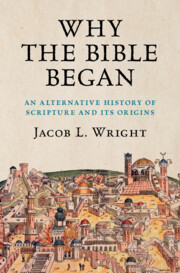Part IV - A People of Protest
Published online by Cambridge University Press: 13 July 2023
Summary
In Part II, we saw how several (rarely read) biblical books portray defeated communities rebuilding Jerusalem from the ruins of a former kingdom. In the same way, our scribes created a new narrative not from scratch, but by piecing together fragments from their pasts. That National Narrative, which we studied in Part III, evolved over the ages from smaller, originally independent pieces. Generations of anonymous scribes collected these pieces, embroidered them with new details, and wove them into an elaborate literary tapestry. Their work portrays the relationship between the two kingdoms, Israel and Judah, and their tragic ends. It not only blends their separate stories, but also sets them in relation to an earlier “United Monarchy.” Yet its most significant achievement was to go beyond this political unity, telling the powerful story of a people who evolved from an extended family and existed for many generations before the emergence of the monarchy and the establishment of a centralized state.
- Type
- Chapter
- Information
- Why the Bible BeganAn Alternative History of Scripture and its Origins, pp. 353 - 472Publisher: Cambridge University PressPrint publication year: 2023



